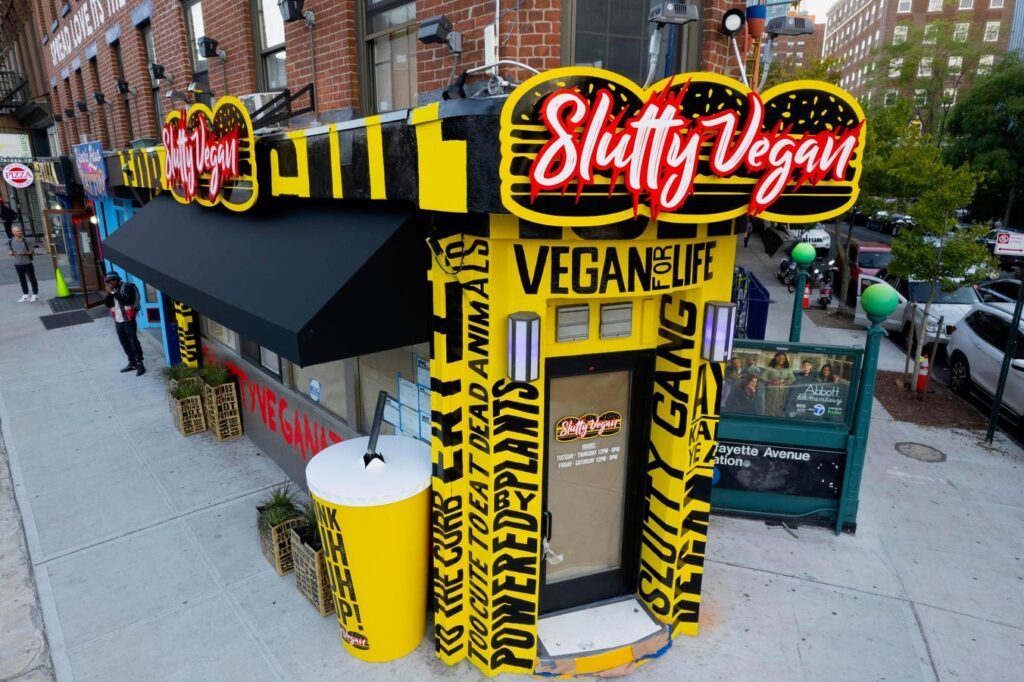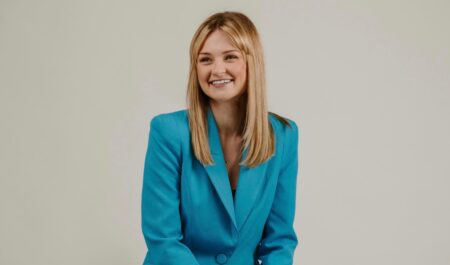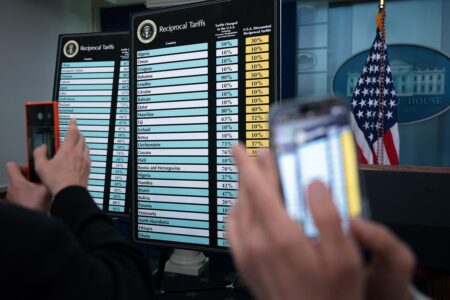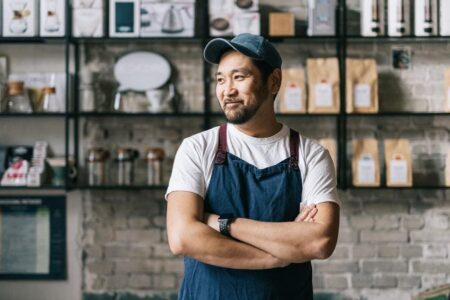Pinky Cole’s Slutty Vegan launched in 2018 and was an out of the box (out of the bun?) success story. A vegan fast food truck with attitude, Slutty Vegan quickly became a $100 million dollar business. Snoop Dogg was a fan, so was Shake Shack’s Danny Meyer, who along with Sundial founder Richelieu Dennis invested $25 million dollars into the vegan chain known for menu items like the Fussy Hussy and its special Slut Sauce.
And it was an incredible story. A Baltimore kid whose father spent 22 years in prison for his role in a cocaine distribution ring, Aisha “Pinky” Cole worked in TV before becoming a celebrated entrepreneur, gracing magazine covers like Essence and Jet and the pages of the New Yorker. When she married Derrick Hayes, the founder of Big Dave’s Cheesesteaks, at the St. Regis Hotel in Atlanta in June of 2013, the New York Times headline read: “A Vegan Restaurateur and a Meat Connoisseur Find ‘No Ordinary Love’.”
But an entrepreneur’s journey is never a straight line. And as Cole reveals here in an emotional conversation, she briefly lost her company, Slutty Vegan. But as of March 28th, she’d bought it back. Here, Cole talks raising capital, buying back her business, and why she believes Slutty Vegan can be a billion-dollar brand.
MICKEY RAPKIN: We need to start with the name, Slutty Vegan. Where did this come from?
PINKY COLE: I gotta take you back. I started my concept after being a casting director for a show called Iyanla, Fix My Life. I thought I had my dream job. I was making about $5,000 dollars a week, which at the time was a lot of money for somebody like me.
RAPKIN: It’s a lot of money now.
COLE: I know, right? It was only supposed to be temporary. I put all my stuff in storage, I came to Atlanta, and I was in my two-bedroom apartment. I know this is Forbes but there was some medicinal marijuana involved, OK? And Slutty Vegan just hit me like a light bulb. I don’t know how spiritual y’all are. But it was divinity for me. I’m a former television producer for The Maury Show. I know a thing or two about provocativeness. I’m like, If I can merge the two most pleasurable experiences in life—that’s sex and that’s food—then I know that I can get people to pay attention.
ERIC RYAN: As you know, the hardest part of a start-up is the name. Once you land that name, everything starts flowing from it.
COLE: I always make this joke, If I would have named it Pinky’s Vegan, I probably wouldn’t have lines down the block.
RAPKIN: You made a conscious decision not to preach the benefits of living a vegan lifestyle. Were you worried that would turn off customers?
COLE: I intentionally did not want to sell veganism. I have not eaten meat since 2007. I’m on a couple of very powerful boards that advocate for veganism. And I realized over the years that oftentimes you can get abrasive. I just want you to have a good time. When you come into a Slutty Vegan, we’re calling you a slut, music is booming through the speakers, it’s a whole vibe.
RYAN: How involved are you with product development?
COLE: I make food that I want to eat. I’m a thick vegan. I like good food. I create food that does not taste vegan, so people can taste it and say, Wow, this is really, really good.
RAPKIN: In 2022, you raised $25 million dollars in a Series A round. Rich Dennis’s New Voices Fund and Shake Shack’s Danny Meyer together took a twenty-five percent stake in the company, bringing Slutty Vegan’s valuation to $100 million dollars. Historically, it’s been difficult for black women to raise capital. What was your pitch? Had you tried to raise capital before?
COLE: Never had to pitch, never went out looking. If you would have asked me this four years ago, I’d have been, like, ‘Yeah, it’s easy to raise money.’ Now I find it difficult. People are a little bit more cautious than they used to be. And navigating through that process is definitely something new for me. But I’m so grateful that I got the initial investment. Because it allowed me the opportunity to grow and scale my business.
Going (For) Broke
RAPKIN: In 2014, you had a restaurant in Harlem called Pinky’s. Two years in, you had a grease fire in the restaurant. You didn’t have enough insurance and you were going broke. What did you learn from that moment? Why come back to food?
COLE: I literally went flat broke. I got evicted out of my apartment, my wages got garnished, I almost lost my mind. Everything that you can imagine could happen to a struggling entrepreneur happened to me. I needed those things to happen. Because all it did was prepare me for my next 10,000 failures. You understand what I’m saying? I’m going through a situation right now in my business that’s incredibly difficult. But guess what? I’ve had failure before. When I first started in this industry, I didn’t know the first thing about SAFE notes. I didn’t know the first thing about equity. I had to fall on my face so many times. I like to say that I paid $25 million dollars to go to Harvard. And when I tell you I got a JD, an MBA, a Bachelor’s—everything that you can think of, I got.
RYAN: (laughing) Grit is everything. I always talk about our failures because that’s where you really learn. I always have an error-autopsy. To be really good at anything you have to remove that fear of failure. And in entrepreneurship that’s hard. Particularly when other people’s money is at stake. An entrepreneur’s greatest risk of failure is to their own reputation.
How Pinky Cole Nearly Lost Her Business
RAPKIN: Would you tell us about one of those challenges that your business currently faces?
COLE: So, I actually lost Slutty Vegan. And I just bought it back. And to say that makes me very emotional. Because for the past year and a half, as a founder, I have dealt with the toughest experience of my life.
RAPKIN: What were the circumstances that led to you losing the business?
COLE: Cash-flow issues. I could not raise any more capital to continue to grow.
RYAN: Four-wall concepts are incredibly hard right now.
COLE: It’s incredibly hard. In 2023, my corporate overhead was $10 million dollars. I was profitable at the unit level. I did double-digit millions last year in revenue. But when you look at my balance sheet there’s a lot of debt there. And because the market is so volatile, people really don’t want to just expend their money in situations like this. I’ve been fighting for my company for a whole year. It got to the point where I was paying $80,000 a week in payroll on my own. And I had to surrender. Surrendering was the best thing that I could have ever done. Because what it taught me is that business is not a straight road, right? You’re gonna get a flat tire here and there. But it’s all about the bounce back, and I’m in my bounce back era.
RAPKIN: How did you get it back?
COLE: I bought it back. I did an ABC—an assignment for the benefit of creditors. Are you familiar with that?
RYAN: I’ve gone through one of those myself. It’s like going to a funeral parlor for startups.
COLE: (smiling) So, you get it, OK? We can go out to dinner. More founders need to have these real conversations. Because oftentimes these restructures happen and nobody ever talks about it. But I’m actually talking about it—and talking about the experience. For 45 days, the business was in the hands of an assignee that paid all the bills, that did everything, and I had to sit back and watch and be patient and just pray that the thing I worked so hard for? That I would get back again. And I’m happy that I have it again. Because it’s rightfully mine. And I know that it deserves to be a billion-dollar brand.
RYAN: I’ve got a startup right now going through a similar situation. It has so much potential, amazing momentum. But in this funding market right now, it’s really hard to raise capital. You’re giving me a lot of hope.
COLE: I had no choice but to surrender. Did I want to do it? No. Was it difficult? Absolutely. But I’m happy that I did. It needed the restructure. It’s OK to baptize the business. If they could do it in the Bible, you can do it in your business.
RYAN: (laughing) I am so going to steal that phrase from you.
RAPKIN: This is a very tough lane. Kevin Hart had a Vegan restaurant in Los Angeles that closed after two years. I think McDonald’s pulled their McPlant off the menu. McPlant is a terrible name. What are they missing that you see?
COLE: Simply put, people don’t want food to taste vegan. They want regular food that tastes good, that just so happens to be Vegan. And I think that I’ve mastered that. For me, in this next stage of my career, it’s just making sure that I have people around that are truly aligned with the vision.
RAPKIN: What would it have meant for you to have lost the business forever? Did you go there in your mind?
COLE: Oh, I went there. I was there. I probably had one of my darkest moments transitioning from not having the business to getting it back.
A Born Hustler
RAPKIN: Pinky, you were a hustler from the very beginning. As a high school student in Baltimore, you were selling Big Macs to your friends for more than McDonald’s was selling them for. I guess it was a convenience fee. Where did that entrepreneurial spirit come from?
COLE: My mom and my dad. My father did 22 years in prison. He was an illegal entrepreneur. My mother was a legal entrepreneur, she is a lead singer of a Reggae band, she still works the same job 38 years later. And I learned a couple of things. I learned loyalty and commitment from my mother, and being honest in your business and responsibility. From my dad, I learned to be a risk taker. Now, his risk taking didn’t pan out like how he wanted to. But that’s not the point. The point is that he took a risk, and I learned that no matter how hard it looks, you got to be willing to take the risk. Because those who take chances make advances. And I merged those two things together. Throughout my life, I just knew that I wanted to be great. And all my friends would laugh at me. Not because they didn’t think that I could do it, they just couldn’t see that far.
RYAN: I’ve never heard of a successful entrepreneur who did not have that hustle show up at the earliest stage.
COLE: I’m still hustling. It’s not even about money, right? Like the money is important. The money gives you freedom to pay the bills. And do the things that you want to do. But just waking up every day and conquering a challenge every day? That is what wakes me up and drives me.
RYAN: This is the first time we’ve had the opportunity to meet. But I’ve heard a lot about you from people, and you’re exactly what I would have expected from this brand. And that’s the magic. Great brands are about creating human connection. You can’t do that if you don’t put your soul into it.
RAPKIN: How do you plan to grow moving forward? Are you going to franchise the business? I know that you’re opening a location at the airport in Atlanta.
COLE: Global expansion is at the top of the list. It’s time to take SV worldwide. You know, you can’t say “Slutty Vegan” overseas.
RAPKIN: Is that true?
COLE: You can’t say “slutty.” We could do SV, SVA, as long as the money’s great. Global expansion is at the top of the list. It’s our intention to be able to scale the brand by way of franchising. (smiling) Maybe I make an announcement very soon—or not—bringing in some strategic leadership to be able to help us grow. And that’s really the focus.
RAPKIN: I want to talk about your philanthropic work. Through the Pinky Cole Foundation, you gifted $9 million dollars to some HBCU grads.
COLE: I watched my Jamaican mother take the shirt off her back to help other people. As you continue to elevate and rise, it’s your responsibility to bring people with you. That’s what I’ve been doing in my foundation. I paid life insurance for black men who make $30,000 or less. We’ve partnered with The Steve & Marjorie Harvey Foundation, I paid tuitions—things seen and unseen. Slutty Vegan is going to be great. It’s always going to be what it is. But there’s something special about being able to use your success to help somebody else win.
RYAN: That’s the greatest legacy you will leave behind someday.
Love And Marriage
RAPKIN: Pinky, your husband is also an entrepreneur. He owns Big Dave’s Cheesesteaks. Do you have any rules about not talking business at home?
COLE: All we do is talk business. I don’t know this man outside of business. I met him in the hospitality space. So, that is our love story. And my husband watched me fall on my face a lot in Slutty Vegan. And he learned a lot along the way. I also watch him go through challenges in his business and then rise above that. Now he’s franchising, so I’m taking notes.
RYAN: I get to work with my wife. And it shows real compatibility in a relationship when people truly love working together.
COLE: You know what helps, too? We’re both competitive. He’s not my competition. But he is. I’m looking at my numbers for today, I’m like, Hmm, what’s going on here? I love that it works. It keeps us both on our toes.
The conversation has been edited and condensed for clarity. If you enjoyed this story about how Slutty Vegan founder Pinky Cole nearly lost her business, click here for more episodes of Cereal Entrepreneur.
Read the full article here











